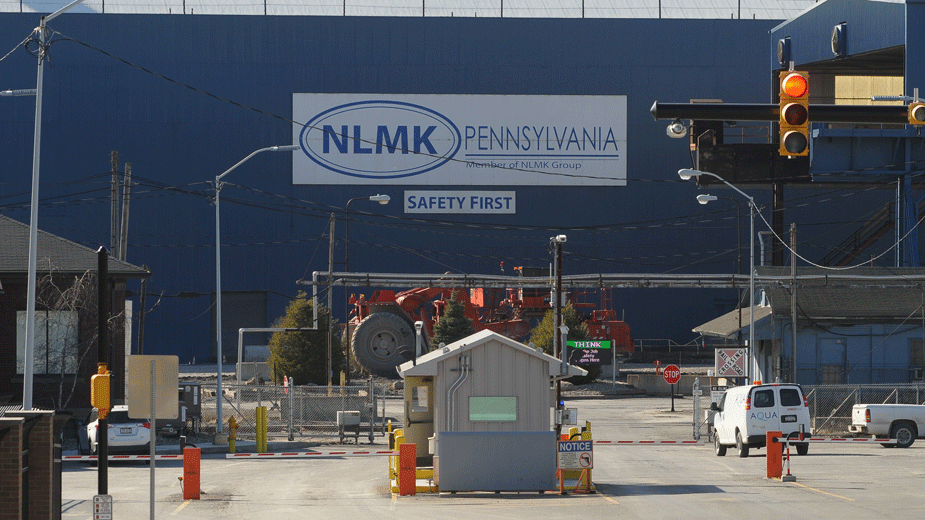Steelworkers, Steel Companies Defend Trump’s Tariffs
YOUNGSTOWN, Ohio – Dan DiMicco, chairman emeritus of Nucor Steel Corp., minces no words when it comes to his support of the Trump Administration’s move to slap global tariffs on steel and aluminum imports.
“If I had my way, we’d be doing a 50% tariff on really bad actors and a 25% tariff on everybody else,” DiMicco said during a conference call Wednesday with other advocates of President Donald Trump’s trade position. “What the president has proposed is a very workable solution to get this process going in the right direction.”
On March 1, Trump proposed enacting duties of 25% on steel imports and 10% on aluminum imported to this country, a move that has been applauded by domestic steel producers.
Joining DiMicco on the call was Leo Gerard, international president of the United Steelworkers, Scott Paul, president of the Alliance for American Manufacturing, Josh Bivens, director of research at the economic policy institute, and retired U.S. Army Brig. Gen. John Adams.
DiMicco told reporters that the first step in stopping illegal imports flooding the United States is to impose a blanket tariff – even on our closest allies and trading partners such as Canada. He said he doesn’t believe the administration will back off on this proposal, at least not now.
“There’s been no indication that they’re backing away and going to be granting mass exclusions for countries,” he said.
That’s because DiMicco said the most egregious violators of U.S. trade law — China in particular — have circumvented duties by shipping steel to other countries for years, even Canada, below the cost of production where they are processed into finished or semifinished products and then shipped directly to the U.S.
A blanket tariff of 25%, he said, would serve as a tough bargaining chip in order to convince countries such as Canada and Mexico to crack down on Chinese, Russian or Korean steel from entering their countries, too. Once they’re on board, then the U.S. could negotiate exemptions.
“If a hand is reached out and not taken, then nothing changes,” he said.
Steelworkers President Gerard appeared to soften on attaching conditions to awarding exemptions to Canada and other countries that “don’t cheat” and “already have a balanced trade agenda” with the United States, but stressed the need for collective resistance against illegal dumping.
Gerard said the Steelworkers also represent members in Canada and he has engaged in high-level discussions with Canadian trade officials who have committed to preventing circumvention.
As an example, Gerard said that South Korea was using Chinese steel to produce its oil country tubular goods, or OCTG, pipe at rock bottom prices, then swamping the Canadian and U.S. markets with the finished product. “Our union and the Canadian government went after that, and we were successful in the trade case,” he said. Once an exemption is granted for Canada, then the country needs to take a strong stand against circumvention, he said.
The objective, Gerard said, is to establish a unified effort to combat dumping and circumvention. “Any country that wants to be a part of the ongoing dialogue has to be against circumvention,” he said.
No tariffs are, as of Wednesday, activated but the proposal already is having an impact on steel producers in the U.S., Gerard said. On Wednesday morning, U.S. Steel announced that it would restart its Granite City blast furnace in Illinois, calling back 500 workers. The mill had been idled for two years.
“We’ve been working for a year to reopen Granite City,” Gerard said. There’s also the potential of re-igniting other operations around the country, such as pipe and tube mills and aluminum smelters.
The U.S. steel industry has borne the brunt of global overcapacity for decades, Gerard said. Fifteen years ago, domestic mills produced 130 million tons of steel per year. Today, the domestic industry produces about 85 million tons, the reduction caused by surplus steel from countries such as China flooding the North American market.
In contrast, China, despite promises to curtail production, has increased steel production over the last 15 years from about 500 million tons annually to 1.25 billion tons per year, he said.
The tariffs, Gerard emphasized, send a “powerful statement that our members and our government are not going to stand back and let this happen without a fight.”
Alliance for American Manufacturing’s Paul said the tariffs should be viewed as a first step, rather than the “last word” on global trade issues. “I believe [U.S. Commerce] Secretary [Wilbur] Ross has articulated that – that this would be the beginning of an unwinding of global steel overcapacity.”
A trade group representing the aluminum industry disagrees.
In a letter to President Donald Trump dated March 5, the Aluminum Association said that it is “deeply concerned” about the impact the tariffs would have on the industry.
“We fear that the proposed tariff will do more harm than good,” the letter said, which was signed by Aluminum Association CEO Heidi Brock. “Unfortunately, the tariffs will do little to address the fundamental problem of massive overcapacity in China, while impacting supply chains with vital trading partners who play by the rules.”
The Aluminum Association boasts membership from 114 producers and converters, including industry titans such as Alcoa, Vulcan and Rio Tinto Alcan. While assessing trade penalties on countries such as China is justified, the Aluminum Association thinks it is misguided to place duties on imports shipped from long-time trade allies such as Canada.
A study released by The Metropolitan Policy Program at Brookings found that including NAFTA trade partners Canada and Mexico in the tariff packages could be especially onerous to states such as Michigan, which imports 70% of its steel and aluminum from these trade partners. Indeed, Canada and Mexico account for 32% of all foreign steel and aluminum shipped to the United States.
Still, other industries are likely to feel the pain of higher prices for steel and aluminum that they use to manufacture their products, threatening jobs in these sectors.
At risk, for example, are steelmakers in the United States that rely on imported steel slabs as feedstock so they can process it into other products.
NLMK USA, a Russian-owned steel conglomerate that operates a mill in Farrell, Pa., is one such company that stands to be hit hard by these tariffs. The challenge is that the mill purchases its slabs from overseas because it’s difficult to source semifinished steel domestically.
A 25% tariff on imports would lead to job losses and threaten its American operations, Bob Miller, chief executive at NLMK USA, told the Financial Times in a story published Wednesday. “That kind of number puts you out of business,” he told the Times, while placing additional financial strains on small, cash-strapped communities such as Farrell.
Nucor’s DiMicco acknowledged higher prices would have an impact on customers and end users, but added that those companies should never have relied on the low prices forced by illegal dumping. “No one has the right to illegally dump product to make them competitive,” he said. “If that’s what they’re depending on, then they shouldn’t be in business.”
DiMicco equated buying illegally dumped foreign steel to a consumer purchasing a stolen television instead of buying it through a local retailer, threatening the business of that local company. “It’s tantamount to criminal activity,” he said.
DiMicco said that there is a process in which companies can apply for exclusions of a certain product, especially ones that cannot be acquired through domestic mills. “People will have to prove the need,” he said.
In the Mahoning Valley, the tariffs could mean a rejuvenation of the struggling steel industry, says Jose Arroyo, business representative for Steelworkers District 1 Sub District 1.
“Companies like McDonald Steel will get a shot in the arm,” he said. And, the reversal of fortune could convince investors to purchase assets of companies that have shut down.
“Our hope is that the tariff will encourage investors to come in and restart Warren Steel Holdings,” an operation that was closed two years ago, but still has equipment on site that if reactivated could resume production.
“We’ve been in a trade war for a decade,” Arroyo said. “This is long overdue.”
Copyright 2024 The Business Journal, Youngstown, Ohio.


